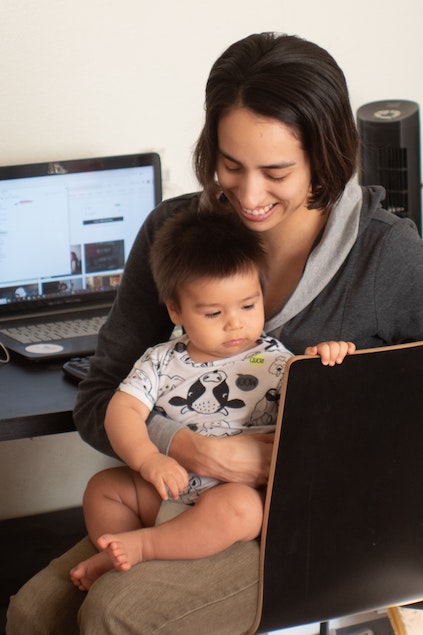How to protect your career when you’re starting a family
The NHS offers extensive legal protection for women returning work after maternity leave. But in practice, managers can find it difficult to get back into the swing of things and employers don’t always make it easy. Alison Moore explains how to protect your career when you’re starting a family.

You’re pregnant! How lovely! A happy, healthy baby – wonderful! Enjoy your maternity leave… But what do you mean you want your old job back?
That is the experience of many women, including some NHS managers, returning to work after maternity leave. As they hand over their baby to a nursery or nanny, enjoy the feeling of being in clothes not decorated with baby sick, and take the first step back into the workplace, they may find their old job has changed or vanished.
Part of the reason lies in the constant reconfiguration of NHS organisations, and this April’s mergers of clinical commissioning groups may add to the problem. Managers are frequently moved between roles, ending up in different reporting structures or a new or merged organisation.
In some cases this means that what they do changes; in others they may be asked to work from a different site, perhaps some distance away. Both may present issues for women returning from maternity leave.
“We have members who came back from maternity leave years ago only to find there has been a reconfiguration and their job no longer exists,” says MiP national officer Claire Pullar. “In some cases, these members have accepted secondment into another role and this had gone on some time. Then, when they have sought to return to their old role or something similar, the job is no longer there – and they are out of time to go to an employment tribunal as the process usually needs to be started within three months of the cause of the complaint.”
This means that women who return from maternity leave and feel they have been discriminated against need to act quickly – there is limited time to try to resolve matters with their employer.
Although there are clear processes to be followed when a job disappears or the location changes, there are some situations which are much less clear. Some women may find their role covers a larger geographical area, for example, and they are regularly expected to visit far-flung corners. That can effectively extend the working day which may be hard to accommodate with caring for a small child or other caring duties.
And in some cases employers are simply not aware that women returning from maternity leave after organisational change have the right to be “slotted in” to another suitable job, if one is available, rather than having to go through a competitive applications and interview process. This recognises the difficulties women who have taken maternity leave would otherwise encounter in talking about recent work experiences if they had to compete to get a role.
Sadly, not all employers have grasped this – despite it being one of the most valuable protections for women who take maternity leave. “I have known women invited in for interview within 24 hours of giving birth,” says MiP national officer Zohra Francis. “Because we were made aware of it we were able to advise that they should be slotted into a position.
“Legally employers are required to make adjustments and an individual on maternity leave is protected,” she adds. “The only way they can be protected is by being slotted in.”
Top tips for maternity leave returners
- know your rights – not just around returning to work but also related rights such as having suitable place at work for breastfeeding mothers to rest.
- don’t accept an offer of a different job or secondment without checking what it means for your rights. Does it affect your ability to lodge an employment tribunal case if things go wrong, for example? Do you have the right to return to your old job after the secondment?
- whatever you decide to do, ensure that you have it in writing – if necessary, put your understanding of what’s going to happen in an email to your manager and ask them to acknowledge it
- you don’t have to feel grateful “just” to have a job after maternity leave – that approach can put you at risk of being taken advantage of
- your MiP officer is here to help – don’t hesitate to contact them if you have concerns or feel you are being treated unfairly.
But another issue that frequently arises is women on maternity leave who may not have been kept in touch with what is happening in the office and may therefore be unaware of the details of any changes. “Keeping in touch” days can help with this – these are optional, do not affect any maternity rights, and employer and employee can agree up to ten of them during a period of maternity leave. Failing to keep women on maternity leave in touch with changes which affect their jobs could amount to sex discrimination.
Of course, it can also be difficult to come back after months out of the office and find someone else has been doing your job – and may have rather enjoyed it. Claire describes one case where a returning manager found someone else had been moved into her job on a temporary basis and her immediate boss wanted to keep them permanently.
It took MiP intervention to resolve the situation, Claire says, but it’s not the only case where MiP has found employers proposing to replace someone on maternity leave with a permanent post-holder. Sometimes this is due to ignorance rather a wilful decision. MiP national officer George Shepherd adds: “The employer should only appoint ever someone on a secondment or a fixed term basis. We know that employers don’t always know what they are doing, but with many situations, members will take what their employers are saying as gospel.”
Where services are transferred to another provider, the position can get very complex. Although staff who are transferring should continue with the same terms and conditions as before and have their continuous service maintained, odd situations do occur.
This happened when public health services moved from the NHS into local government, leaving one manager who spoke to MiP without the maternity rights she had expected. Eventually she reached an agreement with her local authority employer and returned to the NHS after her maternity leave – but with a gap in her employment and pension contributions. “My maternity situation was really stressful at a time when I didn’t need stress,” she says.
It’s also common for women returning from maternity leave to be told they should be ‘flexible’ about what they do. “If you come back from maternity leave and things have changed, don’t let your employ bully you into something different,” says Claire. “The moment you think something is not right, get in touch. By the time people come to me their self-esteem can be affected. All you are trying to do is become a family and provide for them – and it seems that some people are determined to make it difficult.”
Becoming a parent: what are your rights?
Pregnant women are entitled to 52 weeks maternity leave; women can choose when this starts (it can be as early as week 29 of their pregnancy) but it will be triggered if the baby is born or if the woman has time off for pregnancy-related reasons from week 36 onwards. Women who have a stillbirth from week 24 onwards are entitled to full maternity leave.
Many NHS staff will benefit from relatively generous maternity pay for the first 39 weeks of their leave; however, the remaining 13 weeks is likely to be unpaid. They will still accrue annual leave and should receive pay increases as normal.
For many this period will go swimmingly, and the challenge begins when the mother decides to return to work. Her rights depend on the period of maternity leave:
- With periods of six months or less, there is a right to return to their old job on the same terms and conditions – providing the job still exists.
- Anyone taking maternity leave for six to 12 months (what is known as ‘additional maternity leave’) has the right to return to their old job, unless that is ‘not reasonably practical’, in which case they must be offered a similar job on terms and conditions which are just as good. This generally means your job should not be filled permanently while you are on maternity leave even if you take the full 52 weeks.
- If there are redundancies, women returning from maternity leave have a right to be ‘slotted in’ into a suitable vacancy if one exists without having to go through a competitive process. This may be particularly relevant in the NHS where organisational changes lead to jobs being abolished.
- Women who return to work after maternity leave generally have the right to ask for flexible working, such as reduced hours: the employer can turn it down on business grounds but, unless there is a good reason, this could amount to indirect sex discrimination.
Related News
-

NHS job cuts: you’ll never walk alone
As the NHS redundancies in England loom, Rhys McKenzie explains how MiP will back you, and how members supporting each other and acting collectively is the best way to navigate this difficult process.
-

What now? Seven expert takes on the Ten-Year Plan
The government’s Ten-Year Plan for the NHS in England has met with enthusiasm and exasperation in equal measure. We asked seven healthcare experts to give us their considered view on one aspect that interests, excites or annoys them.
-

NHS job cuts: what are your options?
When politicians start reforming the NHS, there is only one certainty: some people will lose their jobs. But what options might be on the table and how does redundancy work? Corrado Valle explains.
